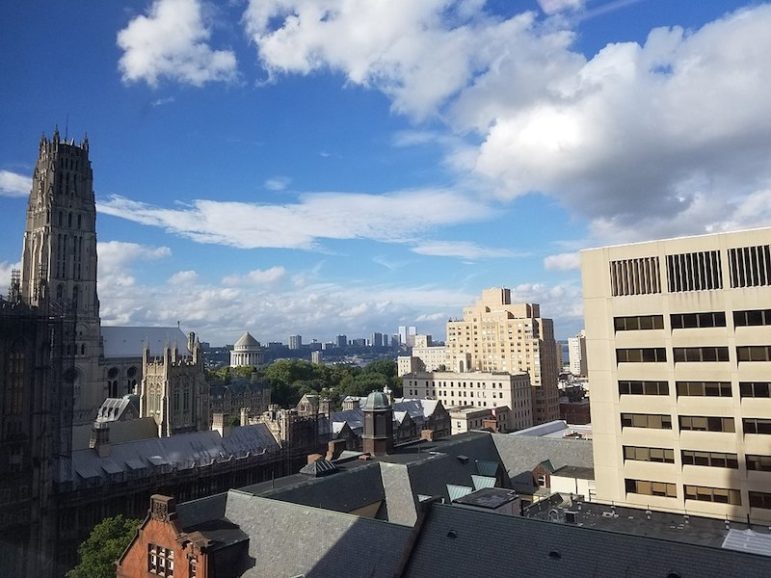
One of the unique features of Morningside Heights is the presence of so many esteemed institutions of higher learning that enrich our community. However, as colleges and universities consider reopening in the fall (assuming they are permitted by the Governor) it is critical they take the well-being of our neighborhood and city residents into account.
The Morningside Heights Community Coalition (MHCC), a group of neighborhood advocates, has written to the heads of Columbia University, Barnard College, Teachers College, Union Theological Seminary, Jewish Theological Seminary, Manhattan School of Music, and Bank Street College, reminding them to consider our community in developing their safety plans.
We have lost neighbors and friends. As of June 15, there have been 2,335 cases of the COVID 19 virus and 262 deaths in the two zip codes of Morningside Heights and West Harlem, 10025 and 10027, according to the New York Times Databse. As has been confirmed, older neighborhood residents and low-income people of color in nearby public housing are particularly vulnerable to the virus. But thanks to the great work of our health care workers and the diligence of social distancing practiced by our neighbors, the threat has been reduced. Now, we fear the influx of thousands of students and employees into our neighborhood could reverse the progress we have achieved.
For some mostly rural, contained campuses, such as Vassar College, highly restrictive in-person class plans have been announced for the coming fall semester, with mandatory quarantine rules and regular COVID testing. In Morningside Heights, Union Theological Seminary will be offering students remote instruction, with options for in-person classes and dormitory residence on their campus.
 CityViews are readers’ opinions, not those of City Limits. Add your voice today!
CityViews are readers’ opinions, not those of City Limits. Add your voice today!
A May 14 letter posted on the Columbia website from President Bollinger states “….we have developed an intricate plan for returning to laboratory research that has necessarily been suspended,” and goes on to say “We all wish to return to in-person instruction and campus life, and our intent is to make that possible as soon as it is safe to do so.” Bollinger states that more information will become available by July 1. Yet the “intricate plan” has not been made available for evaluation by the Morningside Heights community, and should be validated by an independent team of epidemiologists to allay concerns before being implemented. The well-being of the surrounding Morningside Heights and West Harlem communities should be considered. MHCC is urging President Bollinger to make the broader campus and Morningside Heights neighborhood safety plan available for community input before wide release.
Our Morningside institutions, particularly Columbia, have traditionally touted our urban, sprawling campus neighborhood and New York City as attractive draws for a large body of students from across the U.S. and around the world, including from potential hot spots where the COVID virus rate is increasing or raging. Columbia and Barnard housing includes dormitories, but also regular apartment buildings inhabited by real New Yorkers, most of whom have been quarantining. Student life includes active socializing in crowds, roaming our neighborhood, dining out, hanging out and shopping. As the largest neighborhood landlord, Columbia has commendably established loan programs and rent waivers for its neighborhood stores and businesses suffering under the shutdown, and should continue to do so. (These programs should be extended to residential tenants as well.) But if New York Phase 1 or even Phase 2 shutdown conditions remain into the Fall, how many students will come, where will they live and congregate, and under what conditions? The Morningside Heights community, and the rest of New York City, must have a say.
The Bollinger letter also states “Our primary goal must be to create as rich an academic experience as possible, in whatever form that will take, while preparing to bring us back together at the earliest feasible moment.” Who decides what’s feasible? When is the right moment? Morningside Heights thrives when the students return, and the institutions count on our neighborhood and New York to offer their students the attractions of diversity and culture they crave. But Columbia and our other local institutions need to consider the possible irreparable harm to the community if students return too soon.
So Columbia, Barnard, and our other neighborhood institutions — share your plans with community leaders and let independent experts evaluate to ensure that our most vulnerable can enjoy peace of mind. Otherwise, think about going on sabbatical, or taking a gap semester, but please don’t love us to death.
Robert F. Stern is a Board Member of the Morningside Heights Community Coalition.









3 thoughts on “Opinion: Columbia Students, Please Don’t Love Our Community to Death”
Columbia and Barnard students left the area at the start of pandemic in mid March. All the institutions of higher learning have been shuttered for four months. Only local residents remain. To say they contributed to the areas pandemic is quite a stretch. Columbia should be concerned that the local residents will spread covid to their students who will be regularly tested and traced per protocol.
A gap semester would be a disaster for the local community. Many businesses will shut down forever since many are not lucky to have columbia as landlord.
Bring the students back, with safety protocols in place. Or face the reality that we will lose our community feel with empty retail stores
How many tens of thousands of people will return to the “community” if all these institutions resume regular academic instructions?
None of these institution will be in a position to monitor or control behavior on our streets, stores, residential buildings, parks, etc.
This autumn represents a critical juncture in the control of the spread of Covid-19 in NYC. It is arrogant and disingenuous to assume that a massive influx of people into the neighborhood will not have profoundly negative consequences on everyone.
Since when has Columbia University really cared about the neighborhoods it has colonized?